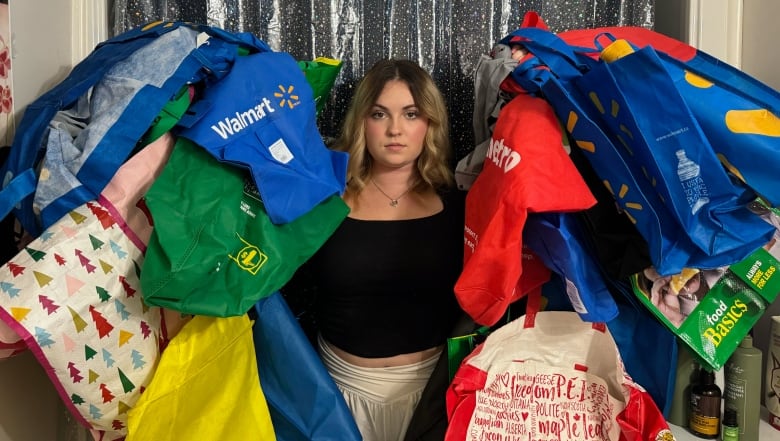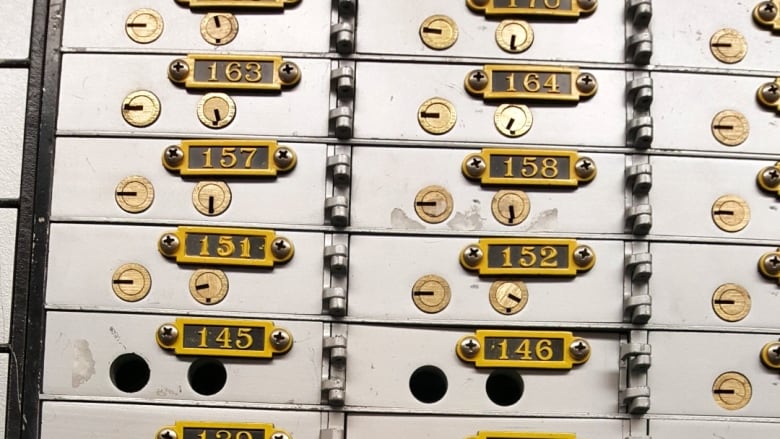
Miss something this week? Don’t panic. CBC’s Marketplace rounds up the consumer and health news you need.
Want this in your inbox? Get the Marketplace newsletter every Friday.
We’re drowning in reusable bags. Are profits preventing big grocers from adopting solutions?

You know the feeling. You’re in line to buy groceries and suddenly realize, with regret, that you forgot to bring reusable bags. So you begrudgingly buy more.
The feeling is so widespread that a catchy song about it has gone viral on TikTok.
Megan Bishop, a college student in Sault Ste. Marie, Ont., felt compelled to post her version of the song. She says she and two roommates recently tossed 175 reusable bags that were piling up. Now, they’re stockpiling more.
“We’re human. We make mistakes. We forget our bags at home and we have to buy them every time, because there’s no other option,” said Bishop.
She wants retailers to offer alternatives, but suspects profits from reusable bags sales are preventing them from doing so.
“To the retailers, I just honestly, I would like to say you need to focus more on the environment,” said Bishop. “Not everything is about profit.”
In late 2022, the federal government rolled out a ban on certain single-use plastics, including checkout bags. The regulations are being contested in court, but still remain in effect.
The plastic bag ban has had an unintended consequence: a proliferation of reusable bags.
Studies suggest reusable bags must be used many times for them to have less environmental impact than flimsy, single-use plastic ones. However, many reusable bags don’t get reused, and wind up in landfills — as they’re difficult to recycle.
Only Walmart addressed CBC’s questions about reusable bag profits. Spokesperson Stephanie Fusco said in an email that Walmart’s popular blue bag, often priced at 33 cents, isn’t a “profit-driver.” None of the grocers addressed questions about why they haven’t adopted a permanent circular in-store bag program. Read more
Labrador residents say ‘inhumane’ food prices force families to go hungry
A mother in a community where the cost of living is one of the highest in the country says grocery prices are “inhumane” and retailers are putting profits ahead of people’s basic human right to food.
Rosie Harris lives in a blended family with seven children in Nain, the northernmost community in Labrador. She and her husband have three jobs between them — it’s the only way they can afford enough food to feed the entire family, she said.
Last winter, when they had just two sources of income, they regularly skipped meals so their children could eat, Harris said.
She still feels anxious some mornings when she reaches for a slice of toast, as though she’s taking something from her family.
“It was hard getting back into a routine of, ‘You can have breakfast and supper, you can have a snack.’ It’s almost like I’m traumatized,” Harris said in a recent interview.
“I don’t know how they would expect those prices to be OK.”
Nain is home to about 1,200 people, and it is one of five fly-in Inuit communities along Labrador’s north coast. As of 2021, the cost of food in Nain was the highest among the remote northern Canadian communities where retail companies qualify for subsidies through the federal Nutrition North Canada program.
WATCH | Marketplace travels to Iqaluit to see the consequences of the grocery price crisis:
The estimated cost of a basket of healthy food to feed a family of four in Nain shot up by nearly 62 per cent between 2011 and 2021, according to data from the program. It’s the highest spike among the reporting communities. The figure is a stark contrast from the other northern communities that qualify for the subsidy, where the average price of food actually dropped by two per cent over that period, data show.
The Nutrition North subsidies are aimed at equalizing food prices across the North and keeping products affordable by offsetting shipping costs. But as Nain shows, it’s not working, said Nicholas Li, an economist at Toronto Metropolitan University who studies the subsidies.
“The important factor about the [program] is there’s absolutely nothing to stop retailers from charging any price they want,” Li said in a recent interview.
The federal government is reviewing the program, and Li said it should consider introducing price caps on products subsidized with public money. Read more
- Marketplace has investigated food prices in Northern communities before. Watch anytime on YouTube or CBC Gem.
How safe are safety deposit boxes? They’re not as protected as you may think

A Montreal-area woman believes carelessness and lack of security at her bank are to blame for the alleged theft of $20,000 in cash from her safety deposit box.
Irina Broido said she and her father opened the box in 2009 to keep important documents, jewellery and money. She eventually became the principal user when her father became too ill to leave the house.
But last February, she discovered her money, which she’d kept inside the box in a clear Ziploc bag for her parents’ funeral expenses, was gone.
“It was like in the movies,” said Broido.”It was a nightmare.”
The police were called to the TD Canada Trust branch in St. Hubert on Montreal’s South Shore and Broido asked the bank to investigate.
But it’s been an uphill battle. Due to the confidential nature of the boxes, only Broido could vouch for its contents. The box also wasn’t insured against theft — and she hadn’t realized that storing cash inside was prohibited.
Broido’s parents are eastern European and grew up with what she describes as “old-fashioned” thinking around money. They didn’t keep savings in a bank account, but at home.
She said a safety deposit box seemed like a reasonable alternative.
“I blindly trusted [them] because it’s a bank,” said Broido. Now she’s questioning their security and protocols.
A few months before her money went missing, Broido said her key began sticking in the lock. The bank couldn’t replace it, so in the fall of 2023, she moved her belongings to a new box and the bank issued a new signing card.
Each box has a signing card that lists who has authorized access. It is a historical record the customer and the bank employee both have to sign to keep track of visits.
But last Christmas, Broido said her card went missing. Despite this, she said the bank employee let her access her box.
“How come I can go freely without signing anything? They said, ‘Don’t worry, we’re going to open it next time,'” she said.
When she visited the bank again in January, she was issued a new card. After the alleged theft, Broido wondered if there were other visits that weren’t properly documented.
In an emailed statement, Caroline Phémius, TD Bank’s public affairs manager, said it has strict protocols in place to ensure the contents in deposit boxes are safely guarded and can only be accessed with the customer present.
“Protecting our customers is our top priority and we take these matters seriously,” said Phémius.
In a letter explaining the decision not to reimburse Broido, TD’s complaints investigator said it could not prove there was money missing from Broido’s safety deposit box. It also could not find any evidence of a discrepancy with her records. Read more
What else is going on?
Does anyone still want kids? Families are shrinking as people have fewer children — or none at all
Canada recorded its lowest-ever fertility rate for the second year in a row in 2023.
The planet is warming at a record pace. So why are many companies retreating from their climate targets?
Volvo, Shell, Air New Zealand among companies that have abandoned previous environmental pledges.
Canadian hockey equipment maker CCM to be bought by Swedish private equity firm
CCM Hockey products are used by star players including Auston Matthews, Sidney Crosby and Connor McDavid.
Marketplace needs your help!

Do you have a story you think we should investigate? Send us your tips, gripes, and groans: [email protected].
Mind Your Business is your weekly look at what’s happening in the worlds of economics, business and finance. Subscribe now.

Catch up on past episodes of Marketplace on CBC Gem.